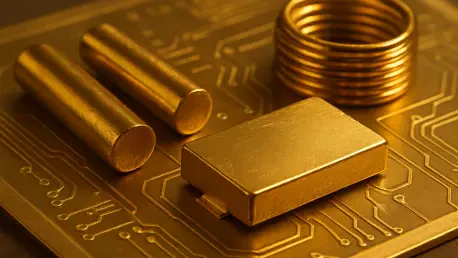Quantum computing, envisioned as a transformative force across various fields, promises solutions to data-intensive problems out of reach for traditional computers. Its potential in drug development, genetic sequencing, and climate modeling holds immense promise. Nonetheless, progress faces a formidable challenge: the imperfections in superconducting materials, such as niobium, which disrupt essential quantum states. These imperfections hinder the quantum systems’ ability to maintain coherent and stable qubits, crucial for processing complex computations efficiently. As the race to achieve quantum supremacy continues, developing technologies to enhance the reliability of quantum computers is of paramount importance.
Breakthrough in Surface Corrections
Gold Layer Application Methodology
Peng Wei, an innovative associate professor of physics at UC Riverside, has crafted a promising solution to this longstanding issue. Wei’s team employs an ingenious technique to ameliorate surface defects in niobium without sacrificing its superconducting properties. By applying an ultra-thin layer of gold—just ten atoms thick—to the niobium surfaces, the process effectively smooths out defects on the quantum material’s surface. This gold coating acts not merely as a barrier but as a quantum shield that prevents disruptive noise and contamination. It ensures the stability of Cooper pairs carrying qubits, essential for maintaining coherence. This strategic balance between layer thickness and surface defect improvement is pivotal. A layer too thick might impede the superconductive capabilities, while too thin a coating may not adequately address the imperfections.
Wei has distinguished this gold application technique for its compatibility with existing fabrication methods, boosting its appeal to those developing commercial quantum processors. Given its innovative nature, Wei has filed for a U.S. patent, envisioning a new standard in quantum computing components. The implications of Wei’s work extend far beyond niobium, as the method’s adaptability to different superconducting materials presents new possibilities for the future of quantum computing technology. The intersection of this advanced technique with other superconductive materials opens a path for further exploration and experimentation.
Addressing Quantum Decoherence
A significant obstacle in the realm of quantum computing is quantum decoherence, where qubits lose their quantum behavior by interacting with environmental noise. Wei’s introduced method addresses this hurdle by reinforcing communication paths among qubits, thereby enhancing their stability. The unobtrusive gold layer not only preserves quantum integrity but also minimizes signal loss in superconducting circuits. This improvement directly correlates with maintaining the delicate quantum states pivotal for complex computation. Enhanced qubit stability translates to more consistent performance and greater reliability in quantum processors, a critical factor in converting theoretical quantum computing potential into tangible solutions.
Wei’s work resonates with the efforts of established institutions like MIT, NIST, and SEEQC Inc., all of which aim for similar breakthroughs. Each step forward in managing quantum decoherence brings the industry closer to operational quantum systems capable of solving complex, real-world problems. As such, Wei’s research into fortifying superconducting materials could become a cornerstone not only for improved quantum processors but also across various applications requiring precision in quantum sensors and advanced computation.
Moving Toward Commercialization
Collaborative Efforts and Support
Wei’s advancement has rapidly gathered the attention of both academia and industry, fueled by substantial backing from a National Science Foundation CAREER award. With this support, Wei’s lab is refining the heterostructure approach further while exploring compatibility with a variety of superconducting materials. This endeavor broadens the practical application of the technique, expanding potential uses beyond immediate academic boundaries. Coupled with growing interest from entities looking to harness quantum computing capabilities, Wei’s approach presents a tangible bridge toward industry adoption.
The UC Riverside Office of Technology Partnerships plays a crucial role in facilitating the transition from research to market-ready solutions. Through a multifaceted strategy encompassing licensing, intellectual property management, and robust commercialization frameworks, the office is aiding in laying the groundwork for a potential startup centered around Wei’s breakthrough technique. Such strategic moves highlight an ecosystem where innovative research seamlessly transitions into viable business opportunities, promoting a culture of continuous advancement in quantum technology.
Future Implications and Prospects
Quantum computing is poised to revolutionize various fields by offering solutions to complex, data-intensive problems that traditional computers cannot handle. Its potential applications in drug development, genetic sequencing, and climate modeling hold incredible promise. Despite its potential, the advancement of quantum computing faces significant hurdles, primarily due to imperfections in superconducting materials like niobium. These flaws disrupt the necessary quantum states, obstructing the system’s ability to maintain coherent and stable qubits, essential for efficiently processing intricate computations. As the pursuit of quantum supremacy persists, the development of technologies that can improve the reliability of quantum computers becomes increasingly important. Addressing these challenges requires not only advancements in materials science but also innovations in the design and architecture of quantum systems, ensuring they can operate consistently and accurately in real-world applications, thus unlocking the true potential of quantum computing across diverse industries.









